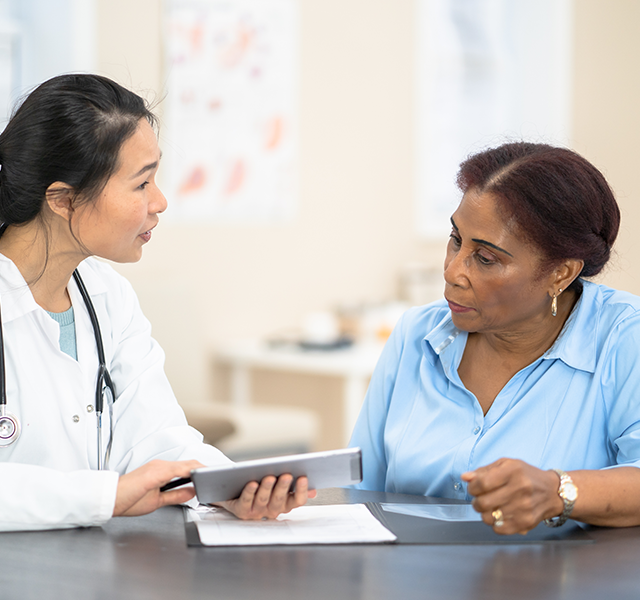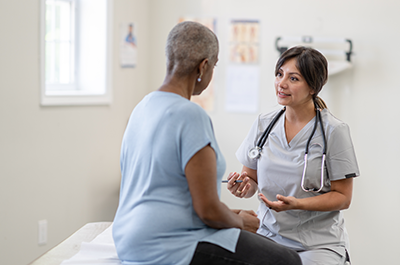This year, the American Cancer Society estimates that about 20,890 women will be diagnosed with ovarian cancer. It is fifth in cancer deaths among women.
"Unfortunately, ovarian cancer is a silent disease," says Miriana Hijaz, M.D., a gynecologic oncologist at Henry Ford Health. "The symptoms are non-specific, which is why most patients are diagnosed with stage 3 or above. Only 20% are found at an early stage."
Symptoms include abdominal bloating, pelvic and abdominal pain, difficulty eating or feeling full quickly, fatigue, stomachaches, constipation, unintentional weight loss and symptoms of bowel obstruction (if the cancer is at an advanced stage). But since many of these signs could also be attributed to other health issues, many aren't diagnosed with ovarian cancer early enough.
Here, Dr. Hijaz shares what to know about your risk factor for ovarian cancer, how you can be proactive about your health and more.
Q: What are the risk factors for ovarian cancer?
Dr. Hijaz: One of the major risk factors for developing ovarian cancer is advanced age. The median age of diagnosis is 63 years old. Early menstruation before age 12 and late menopause after age 55 appear to be risk factors as well. Other risk factors include never giving birth to a child or carrying a pregnancy, along with having endometriosis, which has been found to be associated with some subtypes of ovarian cancer. There are environmental factors as well: certain studies have found an association between asbestos exposure and increased death from ovarian cancer.
Another very important risk factor is genetics. Women with a strong history of breast and ovarian cancers in their families are at high risk for developing ovarian cancer. Carrying gene mutations, such as the breast cancer mutations known as BRCA1 and BRCA2, can increase your risk of developing ovarian cancer by 65% (for the BCRA1 mutation).
The lifetime risk for ovarian cancer among people with the BRCA1 mutation is 39 to 65%, and among people with the BRCA2 mutation it’s 11 to 37%. It is estimated that genetic mutations account for up to 20% of ovarian cancer cases.
Q: Should women who are genetically high risk for ovarian cancer get screened early?
Dr. Hijaz: Yes. If someone is in this high-risk category, we start screening them at an early age, usually during their 20s, or 10 years before the earliest diagnosis of ovarian cancer in their family. We’ll do a transvaginal ultrasound or a blood test to detect any abnormalities.

Ovarian Cancer Care At Henry Ford Health
Q: Are ovarian cysts related to ovarian cancer?
Dr. Hijaz: Many women have ovarian cysts at some point in their lives, and most ovarian cysts are harmless and disappear without treatment in a few months. Cysts that develop in post-menopausal women could be cancerous or malignant—that’s why it’s important to have a routine pelvic exam. If anything is detected, your doctor can order an ultrasound or CAT scan, as well as blood work. But just because you’ve had an ovarian cyst doesn’t mean you have or will develop ovarian cancer—most women don’t develop ovarian cancer.
Q: How is ovarian cancer treated?
Dr. Hijaz: It always depends upon the stage and the functional status (or health status) of the patient, but since most patients are diagnosed with stage 3 and above, it will usually be treated with a combination of surgery and chemotherapy.
Q: What is the survival rate of ovarian cancer?
Dr. Hijaz: In general, if ovarian cancer is caught early and it’s in a localized stage where it hasn’t spread outside of the ovary, the overall 5-year survival rate can be 92%. But if the cancer has spread to nearby structures or lymph nodes, this 5-year survival rate goes down to 75%. And if the cancer has spread widely throughout the body, such as to the liver, lungs other organs, the 5-year survival rate can be much lower.
Q: Can you reduce your risk of getting ovarian cancer?
Dr. Hijaz: There’s no way to completely prevent ovarian cancer, but research has shown there are some factors that can reduce your risk of developing the disease. For example: Taking birth control pills for several years, especially when you’re a young woman, can reduce your risk of ovarian cancer by 30 to 40%. Breastfeeding and giving birth to one or more children, especially before the age of 25, can also decrease your risk of developing ovarian cancer.
For women who are interested in a permanent method of contraception, removing the fallopian tubes is sometimes recommended, as some studies show that certain types of ovarian cancer can originate in the fallopian tubes.
If you have a genetic mutation and are at high risk of developing ovarian cancer, you can significantly reduce your risk by having your fallopian tubes and ovaries removed. This procedure would be scheduled after you’re done having children and you’re around 35 to 40 years old. It’s an important conversation to have with your doctor. Lastly, to reduce your risk of developing any type of cancer, it’s always recommended to eat healthily and exercise.
Reviewed by Miriana Hijaz, M.D., a gynecologic oncologist who specializes in ovarian, cervical, vaginal, vulvar and uterine cancers. She sees patients at Henry Ford Cancer- Detroit, Henry Ford Medical Center - Lakeside and Henry Ford Medical Center - New Center One.



